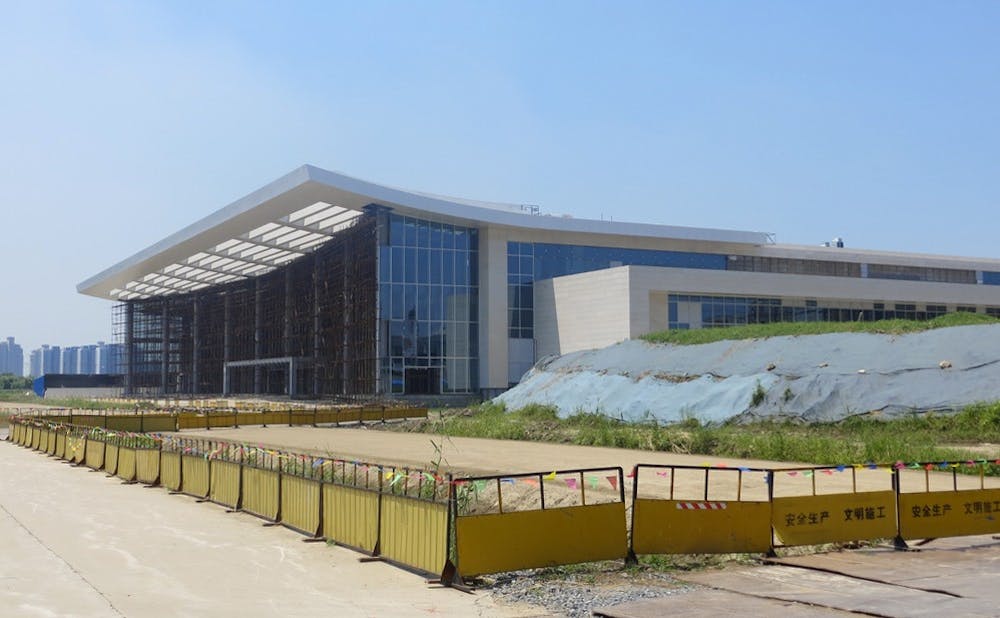Following several recent instances of government crackdown on Chinese universities, administrators outlined their expectations for academic freedom at Duke Kunshan University Thursday.
Arts and Sciences Council heard an update about DKU’s finances, construction, academic programs and academic freedom from Nora Bynum, vice provost for DKU and China initiatives. She said that even though there have been signs of progress concerning academic freedom at Chinese universities, some schools have encountered set backs in recent months.
“We are very curious to see how this all plays out in China,” Bynum said. “But this is clearly not all just bad news.”
This summer, Chinese leadership announced seven topics banned at universities, though Duke never received any such notice. Additionally, three Chinese professors got into trouble with the government because of their outspoken views and academic fields—including one from Peking University, one from East China University and a Sino-Japanese relations scholar working in Tokyo.
But Bynum noted that nine elite Chinese universities signed a statement Wednesday outlining the 10 key components of a research university. The components include a commitment to research training, a toleration of competing views, and a right for the university to set its own priorities about how it will teach and conduct research, among other things.
Several international higher education associations also signed the statement, including the Association of American Universities, of which Duke is a member.
To deal with issues of academic freedom, Mary Bullock—executive vice chancellor of DKU—will monitor the situation in China and report back to the provost. The provost will take concerns to Academic Council. There will also be an annual report on the issue.
She added that DKU’s stipulations for academic freedom are included in the Articles of Association, a public document in China.
DKU is also looking to hire five permanent faculty members for the undergraduate Global Semester Abroad programs. These “non-tenure track but Duke-quality” professors would be DKU faculty—not Duke faculty. Ten to 12 Durham-based Duke faculty members have agreed to teach Global Semester Abroad courses each semester in the campus’ first year.
In terms of finances and construction, projections have not changed in the past six months, Bynum said. Duke expects to pay approximately $5 million per year for the first eight years, and five of the campus’ six buildings will be ready for students by the end of summer 2014.
In other business
Faculty approved new course evaluation questions.
The new questions ask about modes of inquiry, assignments, structure, professor preparedness, motivation for taking the course and more. These changes coincide with this week’s announcement that students will fill out all course evaluations online through ACES instead of on paper.
Faculty raised concerns about the length of the evaluations with the additional questions and what effect that would have on response quality.
Pilot research has shown that comments are more circumspect with the longer, online format, said Matt Serra, director of the Arts and Sciences Office of Assessment.
Lee noted that in the next year, there might be opportunities for faculty to choose to make evaluation comments public. Additionally, professors might be able to create department or course-specific questions.
They approved the changes with 19 voting to approve the motion and three voting against it.
Edna Andrews, professor of linguistics and cultural anthropology, presented a proposal for the Linguistics Program to make faculty appointments in conjunction with other academic units.
The program has interdisciplinary elements—combining linguistics with neuroscience, social sciences and other topics. But they do not have the ability to give regular rank faculty secondary appointments, nor can they hire joint faculty with other units.
Andrews noted that having this capability would benefit the linguistics program when they apply for interdisciplinary grants.
Faculty will vote on the proposal at the November meeting.
Lynne O’Brien, director of academic technology and instructional services, gave an update on Duke’s online courses.
She noted that nearly 9.7 million people downloaded videos from massive open online courses taught by Duke professors. Additionally, about 75 percent of the MOOC students live outside the United States.
In the upcoming year, there are 10 new MOOC courses under development, and two classes are experimenting with online courses only available to Duke students.
Some faculty have expressed concern that the Trinity College of Arts and Sciences does not want to try any new online projects, said Dean of Arts and Sciences Laurie Patton. But this is not the case.
“We’re really interested in moving forward with online,” she said. “It’s not a question of going online. It’s a question of improving liberal arts learning.”
Get The Chronicle straight to your inbox
Signup for our weekly newsletter. Cancel at any time.

